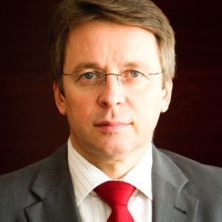Ivan Mikloš, former Deputy Prime Minister and Minister of Finance of the Slovak Republic (2002-2006, 2010-2012), talked about experience of Western Balkan countries and challenges Ukraine faced on its way to the EU at the International Conference “Forward and Upward: Reforming Ukraine during the War” organized by the NGO “VoxUkraine” with the support of the National Endowment for Democracy (NED).
Experience of Western Balkan countries for Ukraine
Considering which of the Western Balkan countries are more successful in simultaneously implementing reforms, EU integration, and post-war reconstruction, like Croatia, and which are less successful in this regard like Serbia or Bosnia and Herzegovina, one can see that the first and most important lesson and precondition for success is political stability and majority consensus on integration into the European Union and NATO. In other words, citizens should want to be part of Western society. In less successful countries internal tensions and instability, and especially the lack of consensus on becoming part of Western society are the biggest obstacles to being successful in the process of integration and reform.
This was an open interview of Ivan Mikloš to Dmytro Goriunov at VoxUkraine conference “Upwards and Onwards” on May 19, 2023. We are grateful to Viktoriia Ahapova for transcription of the speech.
The necessary precondition for future stability and the possibility of uncovering Ukraine’s potential is winning this war. This is very important for many reasons, but one of the reasons is that if this is not achieved, it will create a lot of instability. For the Western countries, this means helping Ukraine as much as possible and more than ever to regain sovereignty, independence, and control over its 1991 border.
Other important preconditions for a successful integration and reform process are leadership, ownership of reforms, and communication. By leadership I mean really strong leaders within the country who are deeply convinced about the necessity of reforms and European integration which will not be easy.
Ukrainian oligarchic system and what needs to be changed
Ukraine, unfortunately, had a typical textbook oligarchic system, especially till 2014. Since 2014, a lot has changed and I see very positive developments, but the influence of oligarchs is still too great. Positive development was due to the much quicker growth of non-oligarchic sectors like IT, technology, and so on. The relative power of oligarchs has also been reduced thanks to reforms and the need for oligarchs to become competitive or lose their companies. What is the most important? First, the rule of law. Among seven conditions that the European Commission put on paper when Ukraine received its candidacy, six have been about the rule of law, oligarchs, and law enforcement. This means that oligarchs will not have a privileged position over the law. If there is free and fair competition everywhere and oligarchs are not competitive enough by that time, they will lose their power and money. It is very important to have a strong, professional, and independent antimonopoly office. Many oligarchs are doing business in monopolistic sectors, and they are abusing their monopolistic positions. Where it is impossible to have free and fair competition, it is important to have a truly professional and independent regulator, such as in the energy sector. Ukraine has regulatory institutions, but at least till now, they haven’t been really independent and professional. Thus it is necessary to go in this direction.
The strongest factor that reduced oligarchs’ power in Slovakia was opening the economy to foreign direct investment. FDI is a strong catalyst for changes. First, firms with foreign investments are putting a lot of pressure on the rule of law and the standards of the business environment. They are growing because they are globally competitive. If oligarchs are not able to compete, their share of money and property will decrease. Some Slovak oligarchs either lost their position in the market by not being competitive or they sold their property to foreign investors or other successful investors.
The best way to deal with oligarchs in Ukraine is to implement reforms as much and quickly as possible, to be successful in EU integration, and to attract as much foreign direct investment as possible. For this, the most important are the rule of law, macroeconomic stability, and predictable conditions. Of course, after the war, it will be necessary to have some specific tools, such as insurance against systemic risks. I know that the government is thinking about PPP projects and how to align the efforts of the government, public institutions, and international public institutions with private investors to participate in the reconstruction of the country.
Reform process
Reforms and EU integration are very interconnected. And in the case of Ukraine, additionally it will be a process of post-war reconstruction. So, the biggest challenge will be how to successfully unite efforts in these three processes: reforms, integration, and post-war reconstruction. It will be difficult in Ukraine, but today’s unity that arose as the answer to the Russian aggression may facilitate the process.
The most important precondition is the majority consensus and unity on doing reforms, being part of Western society, accepting the necessity of all these changes, and voting for politicians who are not populists or demagogues, but for ones sharing this priority for the future. If this exists, then I think all other obstacles will be overcome. If this unity is properly managed and if it is used for the EU integration, reconstruction, and reform efforts, then it could be a great advantage for the future.
You are doing reforms, implementing acquis communautaire or fulfilling all measures not because of Brussels or conditions for being integrated. No, you are doing this because you need it, because your country needs it, because Ukrainians need it. This is very important. I spent five years in Ukraine between 2015 and 2020. The Ukrainian government implemented a lot of reforms at that time, and the country was really starting to change. But the problem was that in the end necessary reforms were passed mostly because of the pressure from the IMF. The politicians were afraid of losing the IMF program because this would imply a default, which in turn would lead to inflation, radical changes in living conditions, frustration of people, etc. However, ownership of reforms means that the society agrees that reforms are important for us, for Ukrainians, for a more effective economy, and for the better lives of future generations. This is the key factor.
Is the EU becoming more regulated than before?
Not only the EU but the whole world is becoming more regulated. The demand for public regulation and government involvement grows because of many reasons, which are global megatrends. The first is, and will be, pressure for more reforms for several reasons.
First, fiscal sustainability is under threat all over the world, even in the richest countries. Global debt is the highest in history. At the same time, money is much more expensive than it was before.
Another problem is that global economic growth will be lower than it was decades ago. The reason is deglobalization, related to geopolitical tensions and the war in Ukraine. Moreover, the green transition is creating new preconditions that are not very favorable for business, especially given the necessity of having not only new investments but also new regulations.
Another important factor is the aging of population, not only in the richest countries in the world but also now in China, where population growth has reached a ceiling and in the next few years the absolute number of people will be decreasing. The aging population means much more public money for pension systems, healthcare etc. and lower economic growth. From this point of view, you can see that even the US, which was historically the leader of the free market economy, is passing new legislation that increases public expenditures and increases regulations, subsidies, and economic nationalism. The recently passed Regulatory Inflation Act is now offering subsidies for American producers of electrical cars and others. This increases state involvement in the economy and overregulation.
Sometimes the problem of overregulation in the EU is overestimated. My experience is that, although there are many regulations in the EU, positive regulations (e.g. those liberalizing and improving business, creating measures for sustainable and responsible public finance, or European competition law) are prevailing over rules that are artificial and only create unnecessary burden on businesses. For members of the EU or countries that are negotiating, positive effects are much bigger and stronger than negative. Moreover, although the EU has its own regulations, the majority of the rules are on the side of national governments.
Take, for example, the EU regulation of motor vehicles that use gasoline. As you may know, the EU passed a regulation that motor vehicles that use gasoline can only be registered in the EU as new until 2035. After 2035, it will be impossible to register new vehicles, including personal cars with classic engines, that use gasoline. Some people think that this regulation is destroying European producers and worsening their competitive position. This is not true because today the transition from gasoline vehicles to electric vehicles is so fast that this change will be completed even sooner than 2035. Thus, European automobile companies have no problem with this regulation, especially since they know that China approved the same regulation. Now it seems that China is going so quickly in producing electric vehicles that classical European, American, South Korean, and Japanese auto producers will have to make the transition to electric vehicles even sooner than 2035 if they want to remain competitive.
But there is one new regulation that is detrimental — a “Euro 7” decree which is currently under discussion in Brussels. European auto companies oppose it because this “Euro 7” regulation proposes that current cars will have to have even stricter limits for CO2 emissions. These companies are now facing real problems competing with Chinese producers as they will have to invest a lot of new money in improving technologies that will be banned after 2035. Therefore, this regulation is detrimental and worsens the competitive position of EU car producers relative to Chinese ones.
About the ban on Ukrainian agricultural products
In Poland, the large majority of the population and the government strongly support Ukraine. Despite this, Poland was the first country to introduce the ban on Ukrainian agricultural products, and not only for the import to Poland but also for the transit, which is even more dangerous.
This experience is showing us that some difficult and politically sensitive issues will arise in the future. The problem is that although free trade, especially in agricultural products, is beneficial for consumers and governments, it is very detrimental for small but politically influential groups of people – Polish, Slovak, Hungarian and Romanian farmers. Moreover, in Poland it is more politically sensitive than in Slovakia, because Poland has more small and medium-sized farmers. It means that many more voters and their families are affected, and governments cannot ignore them. General lesson from this situation is that democracy has its biases, problems, and deformations. It is not the easiest way to manage society and the country, but it is still the best. Rebalancing with some subsidies or transitionary periods will be part of the process.
The only possible solution is some kind of compromise. First, the problem will exist even after the war if Ukraine is reconstructed and developed. Ukrainian agricultural products will be much cheaper than European ones because of lower salaries and standards of living, better soil, and size of your companies. Thus, it will be necessary to find some compromise solution. It was also a good lesson because the crisis was solved in a few weeks thanks to the common approach of Brussels.
Attention
The authors do not work for, consult to, own shares in or receive funding from any company or organization that would benefit from this article, and have no relevant affiliations




